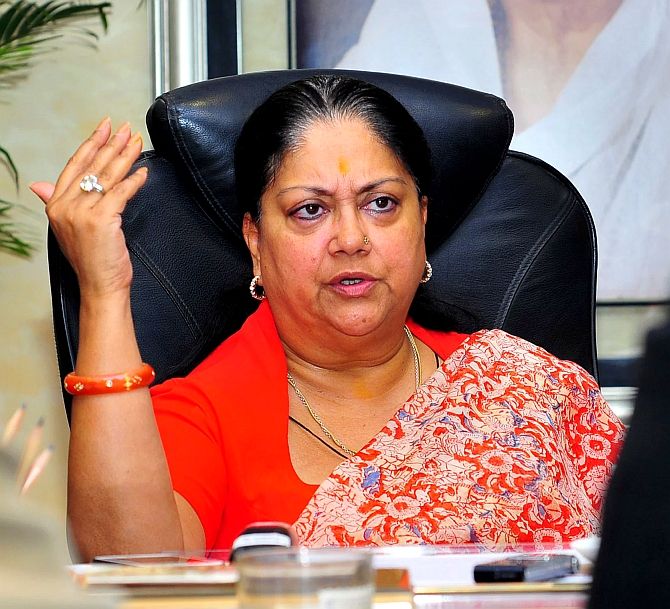
The Vasundhara Raje government has passed an ordinance which seeks to protect both serving and former judges, magistrates and public servants in Rajasthan from being investigated for on-duty action without its prior sanction.
The Criminal Laws (Rajasthan Amendment) Ordinance, 2017, promulgated on September 7, also seeks to bar the media from reporting on accusations till the sanction to proceed with the probe is obtained.
"No magistrate shall order an investigation nor will any investigation be conducted against a person, who is or was a judge or a magistrate or a public servant," reads the ordinance which provides 180 days immunity to the officers.
If there is no decision on the sanction request post the stipulated time period, it will automatically mean that sanction has been granted.
The ordinance amends the Criminal Code of Procedure, 1973 and also seeks curb on publishing and printing or publicising in any case the name, address, photograph, family details of the public servants.
Violating the clause would call for two years imprisonment.
Meanwhile, civil rights group People's Union for Civil Liberties on Saturday condemned the ordinance and demanded that it be repealed, even as state home minister Gulabchand Kataria defended the move.
The minister said the ordinance was brought to put a check on those who intend to create hurdles in government's works for getting publicity.
The Vasundhara Raje government had passed an ordinance which seeks to protect both serving and former judges, magistrates and public servants in Rajasthan from being investigated for on-duty action without its prior sanction.
The Criminal Laws (Rajasthan Amendment) Ordinance, 2017, promulgated on September 7, also sought to bar the media from reporting on accusations till the sanction to proceed with the probe was obtained.
State president of People's Union for Civil Liberties Kavita Srivastava said the amendments and provisos were to "gag the media" and "clipping" the powers of the magistrate to order an investigation, investigate or take cognisance of complaints against public servants including judges and magistrates.
"We will go to the high court tomorrow against the government's move. The ordinance should be repealed," she said.
"It is alarming that the intention is to prevent at the very threshold any possibility of an investigation being ordered by a magistrate when clinching evidence is prima facie brought before the court," Srivastava said.
Meanwhile, Kataria told reporters in Udaipur that sanction will be deemed granted if there is no decision on the sanction request after the stipulated time period of 180 days.
He said a bill will be introduced in the assembly session beginning from Monday to replace the ordinance.












 © 2025
© 2025